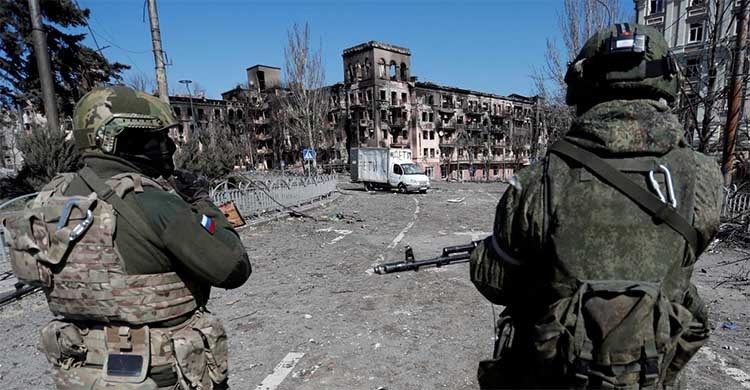G7 to hold crisis talks on Russia's bombing blitz in Ukraine
11 October 2022, 07:45 pm | Updated: 24 February 2025, 05:03 am

The United States and other G7 powers will hold crisis talks Tuesday on Russia's recent bombing blitz across Ukraine that Kyiv's allies said was a mark of desperation and a turning point in the war, reports AFP.
Their meeting comes a day after Russian missiles rocked the Ukrainian capital for the first time in months. A defiant President Volodymyr Zelensky responded by warning Moscow that his country "cannot be intimidated".
Moscow's forces rained more than 80 missiles on cities across Ukraine on Monday, according to Kyiv.
Ukraine's emergency services said on Tuesday that the overall toll had risen to 19 dead and more than 100 people wounded.
The United Nations said on Tuesday the wave of attacks may have violated the laws of war and would amount to war crimes if civilians were deliberately targeted.
"These strikes may have violated the principles of the conduct of hostilities under international humanitarian law," Ravina Shamdasani, a spokeswoman for the UN human rights office, told reporters in Geneva, adding that intentionally targeting civilians and civilian objects, "amounts to a war crime".
Monday's mass barrage came in apparent retaliation for an explosion on Saturday that damaged a key bridge linking Russia to Crimea, a peninsula Moscow annexed from Ukraine in 2014.
Russian President Vladimir Putin blamed Ukraine for the bridge blast and warned of "severe" responses to any further attacks.
Ukrainian Foreign Minister Dmytro Kuleba said the strikes on Monday showed Moscow was "desperate" after a spate of embarrassing military setbacks.
Turkey on Tuesday called for a viable ceasefire between Russia and Ukraine "as soon as possible".
Speaking in a televised interview, Turkish Foreign Minister Mevlut Cavusoglu also called for a "just peace" based on Ukraine's territorial integrity.
Ukrainian officials said Russia had fired another four missiles into the county on Tuesday, all of which were shot down by air defences.
At an urgent meeting of the UN General Assembly on Monday -- called to debate Moscow's declared annexation of four partly occupied Ukrainian regions -- Ukrainian ambassador Sergiy Kyslytsya branded Russia a "terrorist state", noting his own immediate family had come under attack on Monday.
"Unfortunately, you can hardly call for a stable and sane peace as long as an unstable and insane dictatorship exists in your vicinity," he said.
- 'Stay the course' -
Zelensky and G7 leaders were set to convene via video link at 2:00 pm (1200 GMT) on Tuesday to discuss the latest Russian attacks.
The office of UK Prime Minister Liz Truss said she would use the gathering "to urge fellow leaders to stay the course".
"Nobody wants peace more than Ukraine. And for our part, we must not waver one iota in our resolve to help them win it."
German government spokesman Steffen Hebestreit told reporters on Monday that Chancellor Olaf Scholz had spoken with Zelensky and assured him "of the solidarity of Germany and the other G7 states".
French President Emmanuel Macron convened his defence and foreign affairs ministers over the strikes, which he said signalled "a profound change in the nature of this war".
US President Joe Biden condemned Monday's attacks in stark terms, saying they demonstrated "the utter brutality" of Putin's "illegal war".
In a statement, the White House said Biden had spoken to Zelensky and had pledged to furnish Ukraine with "advanced air defence systems".
Ahead of Monday's General Assembly session, UN Secretary-General Antonio Guterres condemned the latest attacks as an "unacceptable escalation of the war", his spokesman said.
Though Russia's UN representative Vasily Nebenzya did not directly address the missile strikes at the session, he defended his country's annexation of Ukrainian regions, saying the aim was "to protect our brothers and sisters in eastern Ukraine".
- 'In an instant... it's death' -
Putin meanwhile was due to meet the head of the UN's nuclear energy watchdog, Rafael Grossi, in Saint Petersburg on Tuesday to discuss the Russian-controlled nuclear plant in the Ukrainian region of Zaporizhzhia.
Moscow recently said it had transferred control of the plant to Russia and fighting around the facility for months has raised fears of a nuclear accident.
And on Wednesday, Putin was to meet Turkish leader President Recep Tayyip Erdogan at a summit in the Kazakh capital Astana, a Turkish official told AFP.
Residents across Ukraine expressed shock and rage after Monday's barrage.
In Dnipro, Ukraine serviceman Maxim was on leave from the front lines for the first time in six months to celebrate his wife's birthday when Russian missiles slammed into the central Ukrainian city, damaging their home.
"We are fighting on the front exactly to protect these places" far from enemy lines, he said. "But they still manage to hit them."
The strike, he said, had made him more determined than ever to repel the Russian forces in northeastern Ukraine.
Since Russia launched its invasion on February 24, more than 7.6 million Ukrainians have become refugees in other European states, while another nearly seven million people have been displaced within the country.
Monday's missile strikes prompted a fresh warning from the UN High Commissioner for Refugees that more people could soon be forced to flee their homes.






















